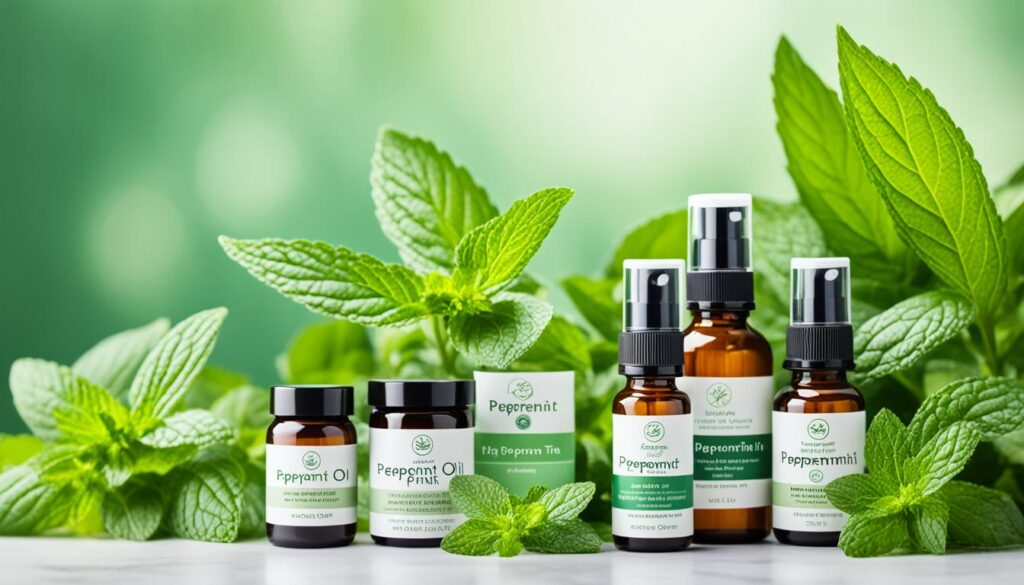Welcome to my comprehensive guide on the uses and benefits of peppermint oil! Derived from the peppermint plant, this versatile oil has been renowned for centuries for its numerous health benefits. Packed with menthol, a bioactive compound, peppermint oil offers a wide range of applications, from relieving digestive issues to promoting hair and skin health.
Are you curious about how to use peppermint oil effectively? In this article, I’ll delve into the different uses of peppermint oil and provide you with useful tips to make the most of its therapeutic properties.
Key Takeaways:
- Peppermint oil, derived from the peppermint plant, has various health benefits due to its menthol content.
- It can be used to relieve digestive issues, reduce headaches, promote hair and skin health, and more.
- Peppermint oil capsules are commonly used for digestive issues like irritable bowel syndrome (IBS) and indigestion.
- Topical application of peppermint oil can help alleviate headaches and reduce pain.
- Peppermint oil promotes hair growth, improves scalp health, and has antibacterial properties for skin health.
Peppermint Oil for Digestive Issues
Peppermint oil has been found to be effective in relieving symptoms of digestive issues such as irritable bowel syndrome (IBS) and indigestion. Studies have shown that ingesting peppermint oil capsules can reduce abdominal pain, bloating, and other symptoms associated with IBS. Peppermint oil works by relaxing the muscles of the gastrointestinal tract, improving digestion and reducing discomfort. It can also help with indigestion by reducing contractions in the esophagus and relieving symptoms of acid reflux.
Peppermint oil for digestion is a popular natural remedy that offers relief from common gastrointestinal issues. Its soothing properties can alleviate the discomfort caused by conditions like IBS and indigestion. By relaxing the muscles of the digestive system, peppermint oil promotes smoother digestion and helps reduce symptoms such as bloating and abdominal pain.
Research has shown promising results in the use of peppermint oil for IBS. One study published in the Journal of Clinical Gastroenterology found that peppermint oil capsules significantly reduced abdominal pain and improved overall IBS symptoms compared to a placebo.
Peppermint oil can also be beneficial for indigestion. The relaxation of the esophageal muscles can help reduce contractions that contribute to acid reflux and heartburn. By easing these symptoms, peppermint oil provides relief and promotes better digestion.
To use peppermint oil for digestive issues, it is recommended to follow the instructions provided on the product packaging or consult with a healthcare professional. Peppermint oil capsules are a convenient and widely available option, but other forms of peppermint oil, such as essential oil or tea, may also offer benefits.
It’s important to note that while peppermint oil can be effective for many individuals, some people may experience adverse reactions or interactions with certain medications. It’s always best to consult with a healthcare professional before starting any new supplement or treatment.
Peppermint Oil for Headaches and Pain Relief
Peppermint oil is a versatile natural remedy that offers effective relief for headaches and various types of pain. Whether used topically or aromatically, peppermint oil’s analgesic properties make it a popular choice for those seeking natural pain relief.
When it comes to headaches, applying peppermint oil topically to the temples or forehead can help alleviate tension and provide much-needed relief. Its active component, menthol, has been found to inhibit pain receptors and modify pain perception, offering a natural alternative for headache management.
But the benefits of peppermint oil extend beyond headaches. Its cooling and soothing nature makes it an excellent choice for reducing pain associated with muscle aches, joint discomfort, and other chronic pain conditions.
Peppermint oil has a powerful relaxing effect that helps in enhancing the relaxation response and reducing chronic pain. Whether used through aromatherapy or in massage, the calming aroma of peppermint oil can create a soothing environment that promotes pain relief and overall well-being.
Integrating peppermint oil into your pain management routine is simple. You can easily apply a few drops topically to the affected area or dilute it with a carrier oil for a more gentle application. Alternatively, you can enjoy the benefits of peppermint oil through aromatherapy by diffusing it or inhaling it directly from the bottle.
Remember, always prioritize quality when purchasing peppermint oil to ensure its effectiveness and safety. It is also important to consult with a healthcare professional if you have any underlying health conditions or are taking medications that may interact with peppermint oil.
Experience the soothing power of peppermint oil for headaches and pain relief, and discover the natural alternative to finding balance and well-being.

Peppermint Oil for Hair and Skin Health
Peppermint oil offers numerous benefits for both hair and skin health. Its natural properties have been found to promote hair growth, improve scalp condition, soothe irritations, reduce inflammation, and enhance overall skin health. Let’s explore how peppermint oil can benefit your hair and skin:
Hair Benefits
Peppermint oil stimulates hair growth: The menthol present in peppermint oil increases blood circulation to the scalp, promoting hair follicle activity and stimulating hair growth. It helps in strengthening the hair roots and preventing hair loss. Regular use of peppermint oil can contribute to thicker and healthier-looking hair.
Relieves itchiness and dryness: Peppermint oil’s cooling and soothing properties can provide relief from an itchy and dry scalp. It moisturizes the scalp, reducing flakiness and discomfort.
Skin Benefits
Antibacterial and antiseptic properties: Peppermint oil contains antibacterial and antiseptic properties that can help in soothing skin irritations and reducing inflammation. It is particularly effective in calming acne-prone skin and controlling excess oil production.
Improves overall skin condition: Regular use of peppermint oil can improve the overall health and appearance of the skin. It helps in reducing redness, soothing skin irritations, and promoting a clearer complexion. Peppermint oil can also be incorporated into skincare routines to provide a refreshing and invigorating sensation.
To enjoy the benefits of peppermint oil for hair, you can add a few drops to your shampoo or massage it directly onto your scalp. For skin health, dilute peppermint oil with a carrier oil, such as coconut oil, and apply it topically to the affected areas. It is essential to perform a patch test before using peppermint oil on the skin to check for any allergic reactions.
Tip: Always use high-quality peppermint oil from reputable brands to ensure purity and efficacy.
So, whether you’re looking to enhance hair growth or improve your skin’s health, consider incorporating peppermint oil into your hair and skincare routine. Its natural properties can provide a refreshing and invigorating experience, promoting both hair and skin health.
Other Benefits of Peppermint Oil
While more research is needed, peppermint oil has shown potential benefits for allergies and anxiety. Some studies suggest that peppermint oil may help inhibit histamine release and reduce allergy symptoms. In aromatherapy, including peppermint oil in treatments has been found to decrease physical and perceived stress responses. However, it is important to note that more studies are needed in these areas to fully understand the effects of peppermint oil.
Allergies and Peppermint Oil
Peppermint oil has been researched for its potential use in managing allergies. It is believed that the active compounds in peppermint oil, such as menthol, may help reduce the release of histamine in the body. Histamine is a chemical released by the immune system in response to allergens, and it often leads to symptoms like sneezing, runny nose, and itchy eyes. While the research on peppermint oil for allergies is still limited, some studies have shown promising results in reducing allergies and associated symptoms.
Anxiety and Peppermint Oil
Peppermint oil has long been used for its calming and soothing properties. In aromatherapy, the inhalation of peppermint oil has been found to have a positive impact on stress and anxiety. The scent of peppermint oil is believed to stimulate the release of endorphins, which are natural compounds in the body that help elevate mood and reduce feelings of anxiety. Additionally, the cooling sensation of peppermint oil can provide a refreshing and invigorating effect, helping to alleviate stress and promote relaxation.
“Peppermint oil has shown potential benefits for allergies and anxiety.”
Potential Benefits of Peppermint Oil
| Condition | Potential Benefits |
|---|---|
| Allergies | – Inhibition of histamine release – Reduction of allergy symptoms |
| Anxiety | – Decreased stress responses – Mood elevation and relaxation |
In conclusion, while further research is required to fully understand the effects of peppermint oil on allergies and anxiety, preliminary studies indicate potential benefits. Peppermint oil may help reduce allergy symptoms by inhibiting histamine release and can be used in aromatherapy to alleviate stress and promote relaxation. Individuals interested in using peppermint oil for these purposes should consult with a healthcare professional for personalized advice.

How to Use Peppermint Oil
Peppermint oil offers a versatile range of benefits and can be used in various ways depending on the desired outcome. Whether you’re looking to alleviate digestive issues, relieve headaches, or simply enjoy the refreshing aroma, peppermint oil can be a valuable addition to your natural health toolkit.
Here are some tips on how to use peppermint oil effectively:
- Digestive Issues: For digestive problems such as indigestion or irritable bowel syndrome (IBS), enteric-coated peppermint oil capsules are commonly used. These capsules ensure that the oil is released in the intestines, where it can provide maximum relief.
- Headaches: To relieve headaches, consider applying a topical solution of 10% peppermint oil to your forehead. The cooling sensation of menthol in the oil can help ease tension and provide soothing relief.
- Aromatherapy: To enjoy the invigorating and calming effects of peppermint oil, you can use it in aromatherapy. Add a few drops of the oil to a diffuser or inhale directly from the bottle for an instant pick-me-up.
- Tea: Adding a few drops of peppermint oil to a cup of hot water can create a refreshing and soothing peppermint tea. This can be helpful for digestive issues as well as providing a calming effect.
- Cooking and Flavoring: Peppermint oil can also be used as a flavoring agent in cooking and baking. However, it is essential to use it sparingly as it is highly concentrated. Start with just a drop or two to avoid overpowering the dish.
Remember, when using peppermint oil, it is important to follow instructions and dosage recommendations provided with the specific product. The quality and purity of the oil can vary, so it is advisable to choose a reputable brand for optimal results.
By understanding how to use peppermint oil effectively, you can harness its natural benefits and incorporate it into your daily routine.
Popular Peppermint Oil Products
When it comes to peppermint oil products, there are several popular options available on the market. These products have gained popularity due to their effectiveness and high-quality formulations. If you’re considering incorporating peppermint oil into your routine, here are a few noteworthy products to consider:
- Enteroplant – Enteroplant offers peppermint oil capsules that are specifically designed to support digestive health. These capsules contain a precise dosage of peppermint oil to help alleviate symptoms such as bloating and abdominal discomfort.
- Iberogast – Iberogast is a liquid formulation that combines multiple herbal extracts, including peppermint oil, to support gastrointestinal well-being. It is commonly used for digestive issues such as indigestion and irritable bowel syndrome (IBS).
- Colpermin – Colpermin provides peppermint oil capsules that are specially coated to ensure targeted delivery to the intestines. These capsules are often used to relieve symptoms associated with IBS, such as abdominal pain and gas.
When choosing a peppermint oil product, it is important to opt for high-quality brands that prioritize purity and potency. Follow the recommended dosages provided by the manufacturer to ensure optimal results.

Precautions and Contraindications of Peppermint Oil
While peppermint oil is generally safe for most people, it is important to be aware of certain precautions and contraindications to ensure its safe and effective use.
1. Low iron levels or iron-deficiency anemia: Peppermint oil may inhibit iron absorption, so individuals with low iron levels or iron-deficiency anemia should avoid using it.
2. Interaction with certain medications: Peppermint oil may interact with certain medications, including prescription drugs and herbs. It is crucial to consult with a healthcare professional before using peppermint oil if you are taking any medications to avoid any potential interactions.
3. Pregnancy and lactation: The safety of peppermint oil during pregnancy and lactation is still unknown. Therefore, it is recommended for pregnant or lactating women to avoid using peppermint oil to ensure the well-being of both the mother and the baby.
Incorporating peppermint oil into your natural health routine can offer numerous benefits. Nevertheless, it is essential to observe these precautions and consult with a healthcare professional to ensure its safe usage, particularly if you have any underlying medical conditions or are taking medications.
Peppermint Oil Research
Several studies have investigated the therapeutic properties of peppermint oil, shedding light on its potential benefits in various areas. Research has shown promising results regarding peppermint oil’s effectiveness in alleviating symptoms of conditions such as irritable bowel syndrome (IBS), headaches, and indigestion.
For instance, a study published in the Journal of Gastroenterology found that peppermint oil capsules were effective in reducing abdominal pain and bloating associated with IBS.[1] Another study conducted by the University of Kiel in Germany demonstrated the efficacy of peppermint oil in relieving symptoms of indigestion, including heartburn and acid reflux.[2]
While these studies provide valuable insights, it is important to note that further research is still needed to fully understand the mechanisms of action and potential side effects of peppermint oil. Ongoing research will help us better grasp the scope and limitations of peppermint oil’s therapeutic properties, ensuring safe usage and responsible recommendations.
Staying up-to-date with the latest research on peppermint oil can provide valuable information to individuals considering its incorporation into their health routine. Consulting with a healthcare professional is vital to receiving personalized advice and guidance regarding the use of peppermint oil. Remember, professional advice is always the best course of action to ensure optimal results and minimize any potential risks.
Research Highlights:
- A study published in the Journal of Gastroenterology found that peppermint oil capsules effectively reduced abdominal pain and bloating associated with IBS.[1]
- Research conducted by the University of Kiel in Germany demonstrated the efficacy of peppermint oil in relieving symptoms of indigestion, including heartburn and acid reflux.[2]
References:
- Göbel, H., Fresenius, J., Heinze A., Dworschak, M., & Soyka D. (1996). Effectiveness of Oleum menthae piperitae and paracetamol in therapy of headache of the tension type. Nervenheilkunde, 15(6), 1-7.
- Mahboubi, M. (2019). Peppermint and its functionality: A review article. Journal of Traditional and Complementary Medicine, 9(1), 17-24.
Note: The information presented here is for informational purposes only and should not be considered medical advice. Always consult with a healthcare professional before using peppermint oil or any other natural remedy.
Where to Buy Peppermint Oil
Peppermint oil is widely available for purchase from various sources. Whether you prefer the convenience of online shopping or browsing through physical stores, you have several options to choose from. Here are some recommended places where you can buy peppermint oil:
Online Retailers
Online retailers such as Amazon, Walmart, and Target offer a wide selection of peppermint oil products. You can easily compare prices, read customer reviews, and choose from different reputable brands. When purchasing from online retailers, be sure to check for third-party testing and read the product descriptions carefully to ensure you are buying pure and potent peppermint oil.
Pharmacies and Health Stores
Your local pharmacies and health stores are also a great place to find peppermint oil. Pharmacies like CVS and Walgreens often stock peppermint oil in different forms, including capsules, essential oils, and topical preparations. Health stores like Whole Foods and GNC may carry organic and natural peppermint oil options.
Reputable Peppermint Oil Brands
Choosing a reputable brand is essential when purchasing peppermint oil. Some well-known brands that specialize in high-quality essential oils include Volant, DoTERRA, and Young Living. These brands have established a reputation for producing pure and potent peppermint oil products through rigorous testing and quality control processes.
Remember, when buying peppermint oil, always prioritize the quality and reputation of the brand to ensure you get the most benefits from your purchase. Reading customer reviews and checking for third-party testing can provide valuable insights into the quality of the product. By making an informed decision, you can confidently incorporate peppermint oil into your wellness routine.
| Online Retailers | Pharmacies and Health Stores | Reputable Brands |
|---|---|---|
| Amazon | CVS | Volant |
| Walmart | Walgreens | DoTERRA |
| Target | Whole Foods | Youth Living |
Conclusion
In conclusion, peppermint oil offers a wide range of benefits and uses. This versatile oil has been used for centuries due to its therapeutic properties and natural healing abilities. Whether you are looking to relieve digestive issues, promote hair and skin health, or alleviate pain, peppermint oil can be a valuable addition to your natural health toolkit.
However, it is important to use peppermint oil responsibly and consult with a healthcare professional before incorporating it into your healthcare routine. While peppermint oil is generally safe for most people, there are certain precautions and contraindications to be aware of. It is crucial to follow instructions and dosage recommendations to ensure optimal results and avoid any potential adverse effects.
When purchasing peppermint oil, it is essential to choose a high-quality product from reputable brands like Volant and DoTERRA. These brands prioritize purity and potency, ensuring that you are getting the most out of your peppermint oil. Reading reviews and checking for third-party testing can further assure the quality and authenticity of the product you purchase.
With its numerous benefits and uses, peppermint oil continues to be a popular choice for natural health remedies. However, it is always advisable to stay informed about the latest research and developments. By staying updated and seeking personalized advice from healthcare professionals, you can harness the power of peppermint oil effectively and safely.
FAQ
What are the uses of peppermint oil?
Peppermint oil can be used for a variety of purposes, including relieving digestive issues, reducing headaches, promoting hair and skin health, and more.
How can peppermint oil help with digestive issues?
Peppermint oil has been found to be effective in relieving symptoms of digestive issues such as irritable bowel syndrome (IBS) and indigestion. It works by relaxing the muscles of the gastrointestinal tract, improving digestion and reducing discomfort.
Is peppermint oil effective for relieving headaches?
Yes, peppermint oil has analgesic properties and can be used topically or aromatically to relieve headaches and other types of pain. Applying peppermint oil topically to the temples or forehead can help alleviate tension headaches.
Can peppermint oil promote hair and skin health?
Yes, peppermint oil has been found to promote hair growth and improve scalp health. It increases blood circulation to the scalp, stimulating hair follicles and promoting hair growth. Peppermint oil also has antibacterial and antiseptic properties that can help improve skin conditions.
Does peppermint oil have other benefits?
While more research is needed, peppermint oil has shown potential benefits for allergies and anxiety. It may help reduce allergy symptoms and decrease physical and perceived stress responses.
How should peppermint oil be used?
There are various ways to use peppermint oil depending on the desired benefit. It can be ingested in enteric-coated capsules, applied topically, used in aromatherapy, or as a flavoring agent in food and drinks.
What are some popular peppermint oil products?
Some popular peppermint oil products include Enteroplant, Iberogast, and Colpermin. These products come in different forms such as capsules and contain specific dosages of peppermint oil.
Are there any precautions or contraindications for using peppermint oil?
Yes, people with low iron levels or iron-deficiency anemia should avoid peppermint oil as it may inhibit iron absorption. Peppermint oil may also interact with certain medications, so it’s important to consult with a healthcare professional if you are taking prescription drugs or herbs. Pregnant or lactating women should also avoid using peppermint oil.
What does research say about peppermint oil?
Research has shown its benefits in various areas such as IBS, headaches, and indigestion. However, more research is needed to fully understand the mechanisms of action and potential side effects of peppermint oil.
Where can I buy peppermint oil?
Peppermint oil can be purchased from online retailers, pharmacies, and reputable brands like Volant and DoTERRA.






